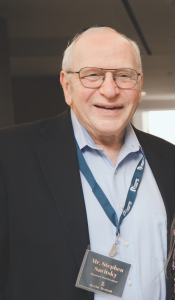Steve Savitsky

Steve Savitsky, Chair, OU Kashrut Commission, 2004-2007; OU President, 2004–2011. Photo: Abbie Sophia Photography
When I became president of the OU, I decided I wanted to also serve as chair of the Kashrut Commission. I felt that since kashrut was the engine behind all of what the OU does, fueling all of its diverse and multifaceted programs, I wanted to learn everything about it. I needed to understand kashrut in order to understand the OU.
Moreover, I thought I could contribute a different and much-needed perspective to OU Kosher. I had spent my entire career in business, and as an entrepreneur I saw things differently. At the time, OU Kosher did not engage in a serious marketing program, for example. From my viewpoint, this was a significant problem. One of the first changes I made was recommending that they hire a marketing director for OU Kosher who would be responsible for new business development. Phyllis Koegel, currently still the marketing director for OU Kosher, was hired in 2006. Attracting new clients all the time, Phyllis travels all over the country, attending numerous food shows each year and bringing in new clients on a steady basis.
Around the same time, we hired an independent research firm to conduct a marketing study on the OU and how it is perceived. The study discovered that for millions of consumers, OU Kosher signifies accountability, reliability and quality. The data proved to be very useful in discussions with new clients.
OU Kosher plays a significant role not only on the national and international level but on the local level as well. Local kashrut organizations, often known as vaadim (kosher councils), frequently call upon the OU for guidance and advice. One service I am particularly proud of is our heavily subsidized program in which our RCs visit communities and perform a comprehensive evaluation of the vaad, assisting in professionalizing and strengthening its overall operation.
The kids looked at me, flabbergasted: “Well, if you can’t trust the OU, you can’t trust anybody!”
I will conclude with a story: Some years ago, when I was OU president, I was in Los Angeles on business. While driving, I noticed two kids wearing yarmulkes and tzitzit manning a lemonade stand. Admiring their entrepreneurial spirit, I stopped the car and got out, planning to buy a cup of lemonade. The kids had placed two huge signs near their stand: On one was written, “Lemonade $1.” Written on a sign right underneath the first was a big OU certification mark. Essentially, it was an unauthorized OU. So I asked the kids: “I don’t understand—what is the circle with the U?” They responded: “Don’t you know what it means? It means that the lemonade is kosher.” Playing along, I said, “But I live in New York where we don’t trust just anyone. How do I know it’s really kosher?” The kids looked at me, flabbergasted: “Well, if you can’t trust the OU, you can’t trust anybody!”
Nechama Carmel is editor-in-chief of Jewish Action.
More in this Section:
Rabbi Menachem Genack as told to Rachel Schwartzberg
Rabbi Moshe Elefant as told to Rachel Schwartzberg
Rabbi Julius Berman as told to Nechama Carmel
Dr. Chaim Wasserman as told to Rachel Schwartzberg
Dr. Simcha Katz as told to Rachel Schwartzberg
Harvey Blitz as told to Rachel Schwartzberg
More Centennial Content:
Keeping Kosher, Becoming American: A Brief History of OU Kosher by Dr. Rafael Medoff
OU Kosher Through the Decades: A Timeline
Photo Essay: From Our Archives – A Collection of Ads, Past and Present
